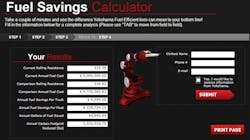Online fuel savings calculator updated
The online fuel savings calculator from Yokohama Tire Corp. has been updated with more information on Yokohama tires and expanded tire comparisons.
The interactive tool allows users to view savings in three ways: annual fuel savings per truck, annual fuel savings for fleet, and annual gallons of fuel saved. It also includes a total carbon footprint calculation when using Yokohama tires compared to competitors, the company said.
“It’s important for fleets to see how the right choice of tires can dramatically reduce the carbon impact on the environment,” said Rick Phillips, director of commercial sales. “For example, one of our tires saved more than 2,000 lbs. of CO2 from being released into the atmosphere. It’s another example of our commitment to produce environmentally-sound products.”
Users can compare Yokohama tires, including its Zenvironment line, to competitor tires and a print function has been added as well.
“We want to show fleets how they can save money with Yokohama fuel-efficient products and the new features we’ve added to the Yokohama fuel savings calculator will do just that,” Phillips said.
